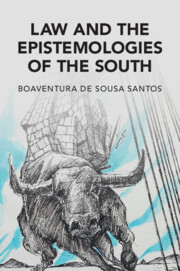Book contents
- Law and the Epistemologies of the South
- CAMBRIDGE STUDIES IN LAW AND SOCIETY
- Law and the Epistemologies of the South
- Copyright page
- Contents
- Preface
- Abbreviations
- Part One The Tragic Optimism of the Law: THE END OF A STORY
- One Unsettling Times
- Two The End of Legal Reformism?
- Three The Early Demise of Legal Reformism: My Journey through the Law and Modernisation Program at Yale University
- Four Room for Manoeuvre: Paradox, Programme, or Pandora’s Box?
- Part Two Epistemologies of the South and the Law
- Part Three The Abyssal Law under the Mode of Abyssal Exclusion
- Part Four Real Legal Utopias: Interrupting the State
- Part Five Real Legal Utopias: Interrupting the Law
- Part Six Real Legal Utopias: Interrupting Hegemonic Human Rights
- References
- Index
- Cambridge Studies in Law and Society
Four - Room for Manoeuvre: Paradox, Programme, or Pandora’s Box?
from Part One - The Tragic Optimism of the Law: THE END OF A STORY
Published online by Cambridge University Press: 07 August 2023
- Law and the Epistemologies of the South
- CAMBRIDGE STUDIES IN LAW AND SOCIETY
- Law and the Epistemologies of the South
- Copyright page
- Contents
- Preface
- Abbreviations
- Part One The Tragic Optimism of the Law: THE END OF A STORY
- One Unsettling Times
- Two The End of Legal Reformism?
- Three The Early Demise of Legal Reformism: My Journey through the Law and Modernisation Program at Yale University
- Four Room for Manoeuvre: Paradox, Programme, or Pandora’s Box?
- Part Two Epistemologies of the South and the Law
- Part Three The Abyssal Law under the Mode of Abyssal Exclusion
- Part Four Real Legal Utopias: Interrupting the State
- Part Five Real Legal Utopias: Interrupting the Law
- Part Six Real Legal Utopias: Interrupting Hegemonic Human Rights
- References
- Index
- Cambridge Studies in Law and Society
Summary
In the early 1970s the first post-war generation of critical perspectives on law and society, and ultimately on legal reformism, was divided between critical legal studies and critical legal sociology. Ten years later, critical legal studies were under attack at elite law schools such as Yale and Harvard, while critical legal sociology was being challenged for losing its political edge and degenerating into positivist, empiricist sociology at the service of mainstream policymakers. At the time, the most relevant and internationally minded collective project along these lines was the Seminar on Legal Process and Legal Ideology meeting regularly in Amherst, Massachusetts, in which I participated. This project was reviewed by David Trubek and John Esser in 1989. It seemed to me at the time that the political divergences, coupled with struggles for power inside the Law and Society Association then celebrating its 25th anniversary, were confusing epistemological with political issues and, above all, were ignorant of the epistemological debates in social studies of science that were debunking positivism at the time. This led me to intervene in the debate, in an attempt to draw attention to the epistemological issues that would later become my major focus in reinventing both critical legal sociology and the political projects it may contribute to.
Keywords
- Type
- Chapter
- Information
- Law and the Epistemologies of the South , pp. 65 - 82Publisher: Cambridge University PressPrint publication year: 2023

